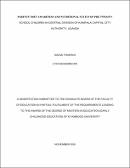| dc.description.abstract | Nutrition is fundamental for good health and early childhood development. If children do not eat the right amounts of macronutrients like protein, fat, and carbohydrates and micronutrients, they may have delayed mental and motor development that can have enduring adverse effects beyond childhood, fall sick or die. However, while many parents in Kampala are aware of the need to feed their children appropriately, they are usually held back by either inadequate awareness on children‟s diet or knowledge of where to get the foods from. Although there are many components in improving dietary habits and food choices that families with preschool children in Kampala can adopt to ensure availability and adequate use of nutritious foods to improve children‟s nutrition, lack of information on diet is hindering these efforts. The general objective of the study was to establish the relationship between parents‟ diet awareness and the nutritional status of preschool children in Central Division of Kampala Capital City Authority, Uganda. A cross-sectional and descriptive design that uses both quantitative and qualitative approaches was used. The study applied mixed research design with target of 10 pre-primary schools in Central Division, about 200 preschool children and their corresponding parents. Interview and questionnaires were used to collect data. Nutritional status assessment involved anthropometric measurement of height and weight against age to classify nutritional status and identify malnutrition based on low height for age to indicate stunting, low weight for height to indicate wasting, and low weight for age to indicate underweight. The 2006 WHO global child growth reference standards were used to establish classification of nutritional status. The data was analyzed using statistical methods such as correlation analysis to establish the relationship between parents‟ diet awareness and nutritional Status of Children. In addition, descriptive and content analyses were used for the analysis of nutritional practices of parents that promote better nutrition Status of children. The prevalence of stunting is moderately high at 2% and underweight is higher at 7.5 % but prevalence of wasting (2%) is almost similar to national statistics (4%). The study showed a significant difference based on gender in wasting and underweight as well as stunting and underweight. The acute malnutrition prevalence measured by mid upper arm circumference was consistent with the weight for height scores that showed higher rates of normal children. Diet diversity is poor comprising mainly starchy food. The diet of children was mostly bananas, sweet potatoes, cassava, millet and maize which are the major staples for the majority of Ugandan families while beans, cow peas, groundnuts, and green vegetables serve as the main protein sources. The poor nutrition practices were attributed to either lack of knowledge by the mother because they were the main respondents or lack of adequate food. Health care workers and teachers are often the people that provide diet information to parents. Diet information is also available to parents, mostly mothers, at health centres and hospitals during antenatal clinics and immunization visits. The study established that awareness on diet does not translate into improved nutritional status in pre-primary school children and better performance in school. Therefore, malnutrition among pre-primary school children in Central Division of Kampala Capital City Authority does not show less access to diet information by parents. | en_US |


